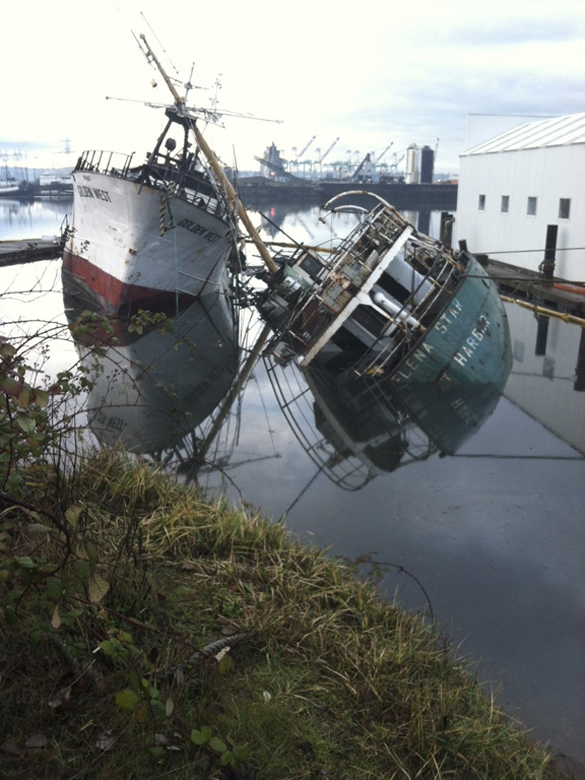The Washington Department of Ecology Monday issued an emergency enforcement order requiring those responsible for the Helena Star to remove the vessel from Hylebos Waterway in Tacoma’s Commencement Bay. According to Department of Ecology officials, the 167-foot steel hull vessel is spilling oil and posing a risk of releasing other contamination into the waterway. The Helena Star and a second vessel named the Golden West are tangled together at Mason Marine docks at the head of the Hylebos Waterway. Both vessels are in deteriorating condition.
On Jan. 25, the Helena Star sank, dragging the 130-foot fishing vessel Golden West over to an extreme angle. The Department of Ecology and the U.S. Coast Guard worked with Ballard Diving and Salvage and the Tacoma Fire Department to contain and remove an estimated 10 to 100 gallons of oil that was released into the Hylebos Waterway. Since then, the sunken Helena Star has continued to discharge small amounts of residual oil, according to Department of Ecology officials. Based on other ships of this age and type, the Department of Ecology is concerned that additional toxic contaminants such as heavy metals, polychlorinated biphenols, and asbestos may also be released into Puget Sound over time from paint, equipment, and other materials on board the vessel. Responders have continued to monitor the vessels since January. Oil containment booms remain placed around both vessels to help contain pollution from residual fuel inside the vessels.
The emergency enforcement order names three Potential Liable Parties (PLPs) and their associated businesses and directs them to raise and remove the Helena Star to prevent further harm to the environment. The order requires the PLPs to submit a work plan for raising the Helena Star to Department of Ecology standards within seven days of the order being issued. If the PLPs fail to file or carry out an acceptable work plan, the Department of Ecology can hire contractors to do the work and charge the PLPs.
Responders were able to temporarily stabilize the Golden West and it remains afloat. However, this vessel rests on tide flats during extreme low tides, and may be at risk of sinking and releasing oil and other hazardous substances into the environment. The Department of Ecology may choose to address the Golden West with a separate enforcement order at a later date.
People are invited to comment on the enforcement order for the Helena Star from April 11 to May 13. The Department of Ecology will review and consider all comments submitted. The comment period will coincide with the Department of Ecology’s review of the PLPs’ work plan, if submitted. The order can be viewed at the following locations: Tacoma Public Library, 1102 Tacoma Ave., in Tacoma; Citizens for a Healthy Bay, 917 Pacific Avenue, Suite 100, in Tacoma; the Department of Ecology’s Southwest Regional Office, 300 Desmond Drive S.E., in Lacey (by appointment only — contact Debbie Nelson at (360) 407-6365 or Debbie.Nelson@ecy.wa.gov); and online here.
Comments may be submitted to the Department of Ecology’s Jim Sachet, Ecology Southwest Regional Office Spills Program, P.O. Box 47775, Olympia, WA 98504-7775. Call Sachet at 360-407-6328 or email Jim.Sachet@ecy.wa.gov.
Before the Helena Star sank, the vessels had been moored at the location of Mason Marine Services, Inc. for about two years, according to Department of Ecology officials. One of the suspected operators of the vessels, Mason Marine, filed for bankruptcy in 2012. According to the Washington State Department of Natural Resources (DNR), at the time of the sinking, the two vessels were among an estimated 179 known derelict or abandoned vessels in Washington state. In March 2012, about 6,500 gallons of oily water, as well as other hazardous substances, were removed from the Helena Star and Golden West, limiting the potential for pollution to the waterway. Despite this action, residual quantities of oil have continued to leak intermittently in the contained area surrounding the vessels since January, according to Department of Ecology officials.
The Hylebos Waterway flows into Commencement Bay. It is home to Chinook, pink, coho and chum salmon and is a habitat for other aquatic and bird species. Spills in this waterway have the potential to adversely impact Puget Sound. Extensive areas of the Hylebos Waterway have been dredged to remove contaminated sediment. The Department of Ecology, the U.S. Environmental Protections Agency (EPA), and the parties who have paid for sediment cleanup work all have an interest in preventing releases of contaminants to the waterway.







